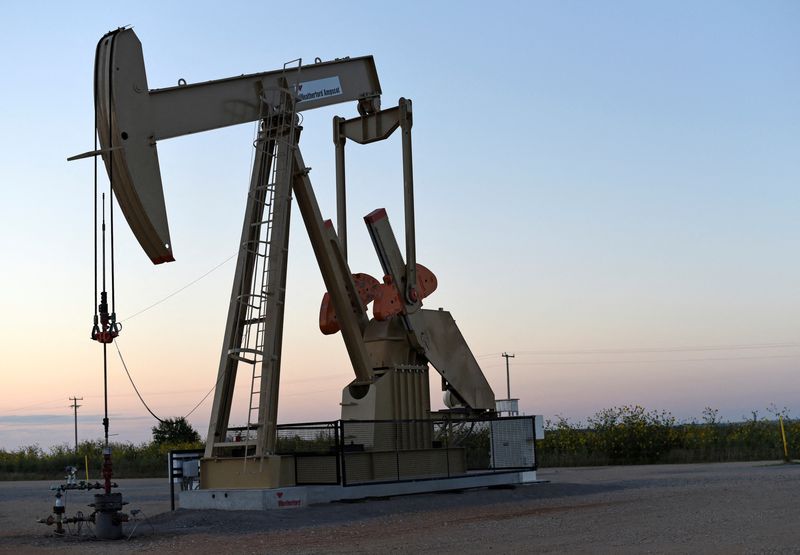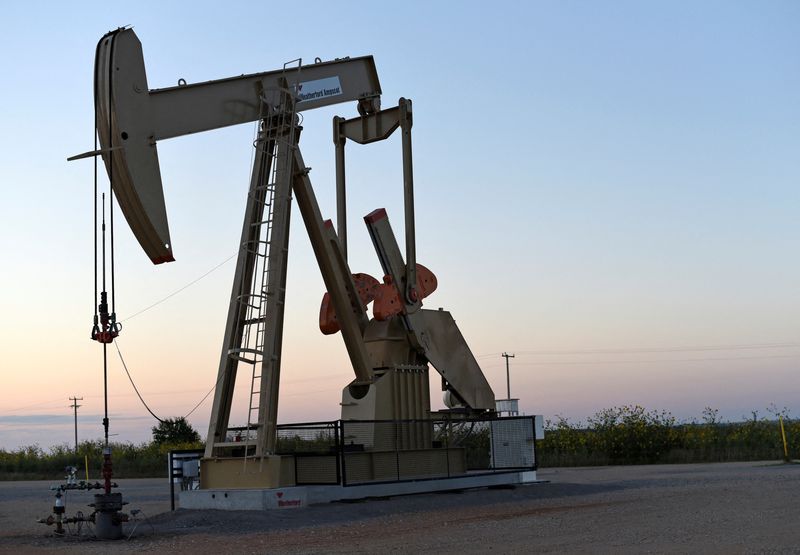Commodities
How Devon Energy missed out on the US oil and gas mega-deal wave

By David French and Arathy Somasekhar
(Reuters) – U.S. oil and gas producer Devon Energy (NYSE:) has lost bids to acquire at least three of its peers in the last 12 months because its shares were spurned as acquisition currency, according to people familiar with the negotiations.
Devon missed out on the sector’s dealmaking boom by losing to ConocoPhillips (NYSE:) the $22 billion deal to acquire Marathon Oil (NYSE:), failing to beat Occidental Petroleum (NYSE:)’s $12 billion bid for CrownRock, and unsuccessfully courting Enerplus (NYSE:) before it was sold to Chord Energy for $3.8 billion, the sources with knowledge of the matter said.
Like its peers, Devon has turned to dealmaking to gain scale as it drills more of its existing acreage. It has struggled to clinch an acquisition as higher drilling costs and production issues made its stock less attractive to acquisition targets, the sources said.
Most recent big deals in the sector, including Exxon Mobil (NYSE:)’s $59.5 billion acquisition of Pioneer Natural Resources (NYSE:) and Chevron (NYSE:)’s $53 billion agreement for Hess (NYSE:), have been all-stock.
All-stock offers help reconcile price disagreements with acquisition targets whose shareholders are reluctant to cash out for fear energy prices may sharply rebound, but are happy to roll their stakes in a deal because they want to stay invested in the combined company.
Acquisition targets were skeptical, however, about the value of Devon’s stock, the sources said. Devon’s shares have underperformed the S&P 500 Energy index by 16 percentage points in the last 12 months, LSEG data shows.
Andrew Dittmar, principal analyst at energy consultancy Enverus Intelligence, said the weakness in Devon’s stock put the company at a disadvantage to rival bidders for companies.
“They had less room to offer premiums and bid-up asking prices without potentially making the deal financially-dilutive to themselves,” Dittmar said of Devon.
A Devon spokesperson declined to comment. In the company’s first-quarter earnings call last month, CEO Rick Muncrief said Devon had a “very, very high bar” on the acquisitions it would pursue.
“Can we find something that makes us stronger? Then we would consider that without a doubt,” Muncrief said.
Founded in 1971, Devon operates in shale formations that include the Permian basin of Texas and New Mexico, the Eagle Ford (NYSE:) in south Texas, and the Williston basin in North Dakota. The company has a market value of about $30 billion.
The doubts Devon’s recent acquisition targets harbored are striking given the strong performance of its stock in the wake of its last major deal. When Devon combined with peer WPX Energy (NYSE:) in a $12 billion all-stock merger at the start of 2021, the company went on to be the best-performing stock in the that year.
Yet despite Devon’s strategy of running a tight ship and returning cash to shareholders, the production issues and higher costs have undermined investor confidence, and the market has more recently fallen out of love with Devon’s stock.
The problems with production included a fire at a key gas compression station in Texas in January 2023, which knocked the facility offline for a number of weeks.
NEW TARGETS
To be sure, Devon’s failure to bag a deal is also a function of its price discipline as an acquirer, as well as heightened competition for assets in the sector, according to the sources.
Some of the companies Devon failed to buy were pricey; Marathon Oil and Enerplus sold at an average premium to their undisturbed share price that was around 3 percentage points over the average premium paid for U.S. publicly listed oil and gas companies since the start of 2023, according to Enverus data.
“Some people feel like when one company does a deal, their competitor needs to do a deal, but smart companies judge every transaction on its merits,” said Kevin MacCurdy, director of upstream research at investment advisory firm Pickering Energy Partners.
Were Devon to give a potential acquisition another shot soon, investment bankers and analysts say logical targets include Permian Resources, Matador Resources (NYSE:), and privately-owned Mewbourne Oil, all of which would bolster its Delaware basin footprint. Alternatively, if Devon wants to reinforce its Williston basin position, it could target privately held Grayson Mill Energy, which Reuters reported is considering sale options.
Buyout firm EnCap Investments, which owns Grayson Mill, declined comment. Permian Resources, Matador Resources and Mewbourne Oil did not respond to comment requests.

Bryce Erickson, who leads valuation consultancy Mercer (NASDAQ:) Capital’s oil and gas group, predicted a deal for Devon was only a matter of time, given the company has managed to overcome many of its production issues.
“Real or imagined, from my chair, there is a sort of feeding frenzy – it’s acquire or be acquired,” said Erickson.
Commodities
Oil prices rise; U.S. crude inventories plunge, Russia-Ukraine truce eyed
Commodities
India’s Reliance to stop buying Venezuelan oil over US tariffs, sources say
Commodities
Oil prices climb on Venezuela supply worries

 Forex3 years ago
Forex3 years agoForex Today: the dollar is gaining strength amid gloomy sentiment at the start of the Fed’s week

 Forex3 years ago
Forex3 years agoUnbiased review of Pocket Option broker

 Forex3 years ago
Forex3 years agoDollar to pound sterling exchange rate today: Pound plummeted to its lowest since 1985

 Forex3 years ago
Forex3 years agoHow is the Australian dollar doing today?

 Cryptocurrency3 years ago
Cryptocurrency3 years agoWhat happened in the crypto market – current events today

 World3 years ago
World3 years agoWhy are modern video games an art form?

 Commodities3 years ago
Commodities3 years agoCopper continues to fall in price on expectations of lower demand in China

 Economy3 years ago
Economy3 years agoCrude oil tankers double in price due to EU anti-Russian sanctions























